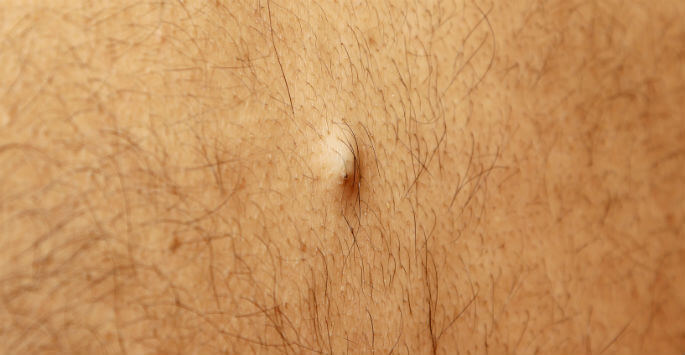A cyst is a pocket of tissue filled with fluid that can develop anywhere on the body. When cysts develop on the skin, they usually feel like a small pea just under the surface. Cysts are not cancerous, but they may cause aggravating symptoms. The good news is that many cysts subside on their own, and most cases are treatable.
Different Types of Skin Cysts
We encourage you to learn more about the various types of skin cysts and what causes them to develop.
Cherry Angioma
These small, bright red growths are less than a quarter of an inch in diameter and can be as small as a pinprick. While the cause of cherry angiomas is unknown, they typically develop in people older than age 40. They usually don’t require treatment, but can be removed if they cause irritation or tend to bleed.
Dermatofibromas
These round, reddish-brown cysts are formed in areas with scar tissue. They feel like a hard lump under your skin and may range in color. While they often cause no symptoms, some dermatofibromas may be painful, tender or itchy. They can be removed if desired.
Epidermoid Cysts
Also called sebaceous cysts, these cysts form when a hair follicle becomes clogged with an oily substance called sebum, which helps to lubricate and moisturize the hair and skin. This type of cyst typically occurs on the chest, back or genitals. They may produce a discharge when squeezed, and will become red and inflamed if infected. Our dermatologist can remove this type of cyst, or antibiotics may be prescribed to prevent it from returning.
Folliculitis
This cystic rash is caused when the hair follicles become inflamed, often due to shaving, friction from clothing or chemical irritation. It’s more common among those with diabetes or who have a weakened immune system. Folliculitis is typically treated with antibiotics.
Ganglion Cyst
This type of cyst usually forms along the tendon in your wrist or hand. While the cause is unknown, they are more common among women than in men.
Get Your Cysts Evaluated
While the cause varies depending on the type of cyst you have, most skin conditions of this kind are linked to infection, inflammation or blockages in ducts. Some cysts form as a symptom of another condition, such as an immune disorder. If you are concerned about an unusual growth on your skin, our dermatologist at Steele Creek Dermatology can evaluate the lump and help determine what treatment steps you should take. Contact us today to schedule your appointment at our office in Charlotte.


